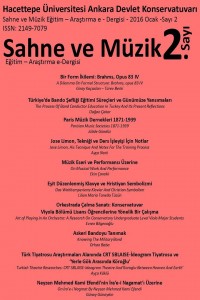Öz
Brahms’ın Opus 83 piyano konçertosunun, üzerinde belki de en çok tartışılan, hatta teorisyenleri ikileme düşüren özelliği, dördüncü ve son bölümü olan Allegretto grazioso’nun biçimsel yapısıdır: “Sonat-rondo mu, yoksa sonat-allegro mu?”
Böylesi bir tablo, bu çalışmanın çıkış noktasını teşkil etmiş ve Allegretto grazioso’nun formunu net biçimde ortaya koyan bir analiz gerçekleştirilmesi amaçlanmıştır.
Beş ana boyuttan oluşan ve bölmeden cümleye dek farklı düzeylerde form öğelerinin saptandığı analiz sonucunda, aşağıdaki temel sonuçlara ulaşılmıştır:
Bölüm, bir sonat-rondodur.
Yukarıda anılan ikilemin nedenini, biri Gelişme’nin, diğeri de Coda’nın önüne gizlenmiş olan iki a periyodu oluşturmaktadır.
“Sonat-allegronun, Brahms’ın kullandığı tüm form kalıpları içinde birincil önceliğe sahip olduğu” gerçeğinden hareketle, bestecinin, Allegretto grazioso için de çıkış noktası olarak sonat-allegroyu tasarladığı; daha sonra ise, söz konusu gizleme eylemi yardımıyla, formu ustalıklı bir biçimde sonat-rondoya dönüştürdüğü düşünülebilir.
Anahtar Kelimeler
Brahms Opus 83 Allegretto grazioso sonat-rondo sonat-allegro form analizi
Öz
Possibly the most disputed feature which even keeps theorists in a dilemma, on Brahms’s second piano concerto, opus 83, is the
formal structure of the last movement, Allegretto grazioso: “Sonata-rondo or sonata-allegro?”
Such a frame forms the launchpad of this study and an analysis suggesting the formal structure of Allegretto grazioso precisely
is aimed.
As a result of the analysis consisting of five main dimensions and detecting every single unit from phrase to section on each layer
thoroughly, the following main results have been carried out:
The movement is a sonata-rondo.
The seed of the dillemma mentioned above is the two “a” periods hidden before the Development and the Coda.
Starting from the fact that “sonata-allegro has the greatest priority in Brahms’s formal schemes”, it can be thought that the
composer might have designed a sonata-allegro for the movement at first, but then have changed the form into a sonata-rondo
proficiently with the hiding practice mentioned before.
Anahtar Kelimeler
Brahms Opus 83 Allegretto grazioso sonata-rondo sonata-allegro form analysis
Ayrıntılar
| Birincil Dil | Türkçe |
|---|---|
| Bölüm | Makaleler |
| Yazarlar | |
| Yayımlanma Tarihi | 1 Şubat 2016 |
| Yayımlandığı Sayı | Yıl 2016 Sayı: 2 |


